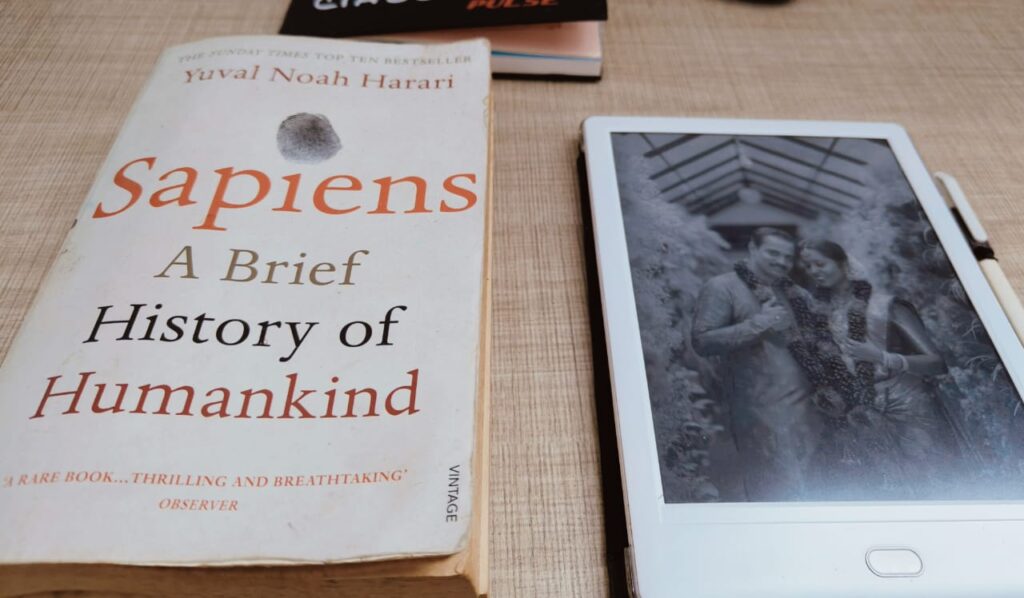“Sapiens” by Yuval Noah Harari is a literary masterpiece that takes readers on an enthralling journey through the annals of human history, unraveling the complex tapestry of our shared past. In this review, we will delve into the key themes and insights offered by Harari, exploring the book’s impact on our understanding of Homo sapiens and the forces that have shaped our existence.
Harari’s writing style is a breath of fresh air, transforming what could be a daunting exploration of history into an accessible and engaging narrative. From the outset, the author positions himself as a knowledgeable yet approachable guide, ready to lead readers through the twists and turns of our evolutionary journey. The simplicity of his language and the structure of the book make it accessible to a wide audience, from casual readers to those with a keen interest in history and anthropology.
The journey begins with the cognitive revolution, a pivotal moment when Homo sapiens experienced a transformative shift in their cognitive abilities. Harari skill-fully paints a picture of a world where our ancestors coexisted with other human species, such as Neanderthals. The author’s exploration of the cognitive revolution serves as a foundation for understanding the subsequent developments that shaped human societies.
Harari then guides us through the nomadic days of hunter-gatherer societies, offering glimpses into the challenges and triumphs of our early ancestors. The transition from foraging to agriculture during the Agricultural Revolution is presented with clarity, emphasising how this shift had profound implications for the organization of human communities and the development of civilizations.
One of the strengths of “Sapiens” lies in its ability to connect the dots between seemingly disparate historical events. Harari weaves a seamless narrative that spans the epochs, exploring the rise and fall of empires, the influence of shared myths, and the interplay between biology, culture, and politics. Each chapter serves as a captivating snapshot of a particular era, making the book a compelling page-turner.
The exploration of shared myths and narratives as crucial components in the evolution of human societies is a central theme in “Sapiens.” Harari argues that our ability to believe and propagate shared stories has been a driving force behind our success as a species. From the myths that bound early communities together to the creation of imagined orders like money and nations, the author sheds light on the power of collective imagination in shaping our identity and societal structures.
As the narrative unfolds, “Sapiens” delves into the challenges and consequences of human progress, particularly in the realms of capitalism, imperialism, and scientific advancements. Harari doesn’t shy away from questioning the ethical implications of our choices, encouraging readers to reflect on the impact of our collective actions on the planet and future generations.
Harari’s exploration of the contemporary globalized world is both enlightening and accessible. The book prompts readers to contemplate the complexities of our modern existence, raising important questions about the sustainability of our current systems and the ethical considerations surrounding technological advancements.
In the concluding chapters, Harari turns his attention to the future, urging readers to consider the path we are collectively forging. The author’s insights into the challenges of our present and the uncertainties of tomorrow foster a sense of responsibility and contemplation. “Sapiens” serves not only as a historical exploration but also as a call to action, prompting readers to critically assess the choices we make as individuals and as a species.
In conclusion, “Sapiens” stands as a captivating and enlightening exploration of the human odyssey. Harari’s storytelling prowess and adept simplification of complex concepts make this book an essential read for anyone curious about the roots of human civilization and the forces that have shaped our existence.
“Sapiens” by Yuval Noah Harari invites readers to embark on an intellectual journey, unraveling the profound interconnectedness of our shared history and prompting thoughtful reflection on the past, present, and future of Homo sapiens.
If you’ve enjoyed this review of “Sapiens,” explore more captivating book insights on our blog. From fiction to non-fiction, our diverse collection awaits your discovery. Join us in the world of literature and find your next great read. Dive into more reviews on our blog and continue the literary journey with us. Happy reading!

Pingback: Yuval Noah Harari's captivating